The following guidelines should help during the first week after surgery. Although individual responses vary widely following any operation, you (or your child) can expect to return to normal in about ten (10) days.
DRESSING AND WOUND CARE : You have the possibility of having a large head dressing on when you are discharged from the hospital. You will be given an appointment to come into the office the next day to have it removed. If you do not have a dressing, you will have a cotton ball in your ear canal, which will need to be removed. You will return to the office for this within five to seven (5-7) days after surgery. You may have stitches behind your ear, which may need to come out in seven to ten (7-10) days. The stitches will need to be cleaned with peroxide and a Q-tip twice a day. You may shower or wash your hair if you place a cotton ball in the ear and cover it with Vaseline. Keep water out of the operated ear.
DO NOT “pop” your ears by holding your nose and blowing air through the Eustachian tube in to the ear. If it is necessary to sneeze, do so with your mouth open.
DO NOT take any unnecessary chance of catching a cold. Avoid undue exposure or fatigue. Should you catch a cold, treat it in your usual way, reporting any ear symptoms to the office .
DO NOT have dental work requiring drilling of the teeth until three (3) weeks after the surgery. You may anticipate a certain amount of pulsation, popping, clicking and other sounds in the ear, and also a feeling of fullness. Occasional sharp shooting pains are not unusual. At times it may feel as if there is a liquid in the ear
DO NOT plan on driving a car home from the hospital. Air travel is permissible two (2) weeks after surgery. When changing altitude you should remain awake and chew gum to stimulate swallowing.
ACTIVITY : After the dressing is removed you can resume your normal activities as tolerated.
DIET : After discharge from the hospital or surgery center, adequate fluids are essential and may be given in almost any form such as water, soda, juice, jello or popsicles. Encourage fluids for at least ten (10) days. Drinking citrus fruit juices, pineapple and tomato juice may sting due to the acid, and should be discouraged. Soft foods are tolerated best at first and should be encouraged. Highly seasoned or very scratchy food should be avoided. Normal diet can be advanced as tolerated.
PAIN : Pain and discomfort varies with each patient after surgery. Medication may be prescribed to help control pain, take as directed. You may also use Tylenol or Acetaminophen. If significant pain around the ear not adequately treated by pain medication occurs, please contact us. See contact information below.
FEVER : Very slight elevations of temperature during the first few days are usual. If the temperature goes above 101.5 degrees, please contact us. See contact information below.
VOMITING : Nausea and vomiting may occur following anesthesia and usually clears after the first day. If persistent nausea and vomiting occurs after the first day at home, please contact us .
DIFFICULTY SWALLOWING : There may be some mild ear discomfort when swallowing. This is expected. Use medications as directed to help control pain. If symptoms persist, please call the office for any concerns. See contact information below.
MEDICATIONS : Medication may be prescribed to help control pain, take as directed. You may also use Tylenol or Acetaminophen. If you have been prescribed an antibiotic, take as directed. You may resume any other medications that you use regularly. If taking pain medications, avoid drinking alcohol or other dangerous situations.
DO NOT TAKE ASPIRIN OR ASPIRIN CONTAINING MEDICATIONS FOR AT LEAST THREE (3) WEEKS.
FOLLOW-UP VISIT TO THE OFFICE : If a postoperative appointment has not been made for you, please call the office the day after surgery to arrange an appointment within one to two (1-2) weeks following the surgery.
PROBLEMS AND QUESTIONS : For any problems that arise, or to ask any questions, please call the office during regular business hours at (772) 398-9911, (772) 464-6055, (863) 357-7791 or contact the Answering Service after hours by dialing (772) 320-0400. Drs. Berghash, or Lanza are on call after hours and weekends for emergencies.

